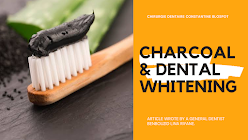
For any freelance content writing please comment.
Whitening our teeth is not a new practice in dentistry, however, in the last years its popularity has enormously grown and it is one of the very requested procedures from patients who seek a white and an attractive smile, since it increases their self-esteem.
Even though, this dental whitening does improve their image, beauty and charm, it may also have risks and side effects.
There are many types of dyschromia in dentistry. In traumatized teeth, tetracycline staining, fluorosis, and there are also extrinsic colors( due to food..etc)
There are many methods used in dental whitening: using laser, chemical agents or using both.
Today we are going to talk about " charcoal" in a medical perspective, is it really efficient when it comes to dental whitening?
There are many toothpaste brand which are fabricated using the charcoal powder, such as: Dr.organic, and coalgate toothpaste. The are numerous examples in the market in all countries around the globe.
Contrary to what have been promoted, activated charcoal has no scientific proof to support the previous claims in this article. For that, Mc Franco, JLS Uehara, BM Maroni, and GS Zuttion wrote on article untitled as :
" The Effect of a Charcoal-based Powder for Enamel Dental Bleaching"
Group 1 mechanical brushing with a 1450-ppm F toothpaste (control group).
Group 2 mechanical brushing with an activated charcoal-based powder.
Group 3 bleaching per the standard protocol using 10% carbamide peroxide.
After 14 days, a study was made using a scanning electron microscope (SEM) on: the surface roughness and color of each specimen.
Group 1 a more irregular surface.
Group 2 no significan effect.
Group 3 significant effect of whitening.
Another study, Franco et al. tested the whitening performance of charcoal powder and reported no effectiveness on the tooth whitening. On the other hand, a little whitening effect of charcoal was shown in an in vitro study. However, Palandi et al. observed slight alterations on the enamel surfaces after brushing with activated charcoal powder and regular toothpaste. Pertiwi et al. also reported an increase in surface roughness after 1-and 3-month brushing with a charcoal containing whitening toothpaste.
What we resume from these studies is, that activated charcoal is not efficient in dental whitening. In contrary, its continuous usage may lead to enamel deterioration and erosion, which can lead to sensitivity and cavities. This conclusion was published in August, 2019 by Dr Susan Maples a Mechigan Based Dentist.
This article was written based on : a scientific opinion, of a dentist and published articles.
Example of Source: Ada, the Academy of Dental Learning and OSHA Training.

Commentaires
Enregistrer un commentaire